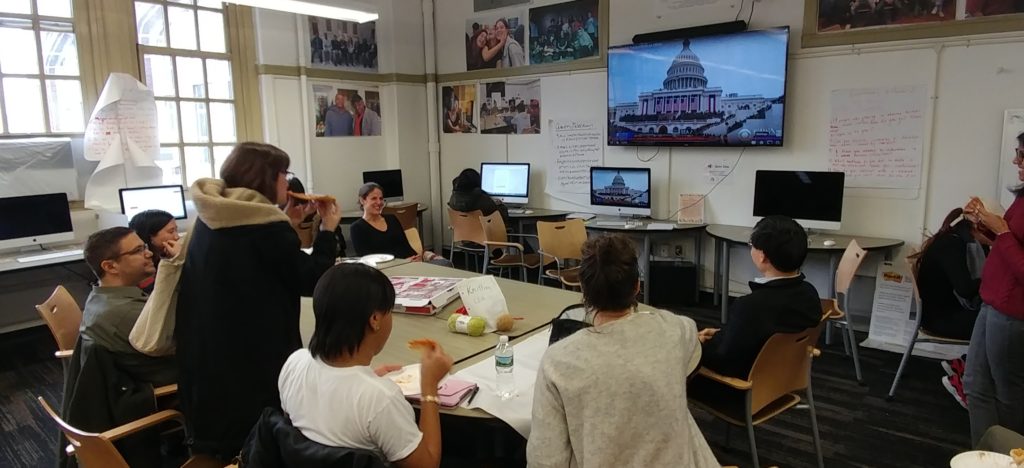This Sunday feels like a good time to write about what’s happening on my blog. I haven’t written as much as I would have liked over the past few weeks, so I feel a little explanation is due.
I'm starting my #MTBoSblogsplosion today, I'm going to blog every other school day, and posting at least 1 math resource each month in 2017
— Carl Oliver (@carloliwitter) January 3, 2017
We have not had any actual classes for the past few weeks so there has been any actual teaching since my last class log. Most of those class days were spent floating around the room helping kids, so there wasn’t much to blog about earlier in January. There was also a lot of administrative tasks needed for the individual scheduling for students. (It’s a super cool network of google spreadsheet that I may blog about later on my other blog). … Oh and it was my wife’s birthday. So we had our first baby-sat date night at Olmsted, which was really nice. I plan to write more with the start of February, where I won’t be inhibited by my lack of classes to talk about, my administrative demands, or my frenzied last second search for birthday presents. So I guess that’s the only thing that’s going on with this blog about teaching and learning.
Oh wait. I actually didn’t mention that other thing that happened towards the tail end of January. Technically it was a November thing, but most of the work that I took on didn’t start until mid-January. I really underestimated just how much time I would need to devote to this. What I had to do for this thing was curl up into the fetal position on my couch/floor/classroom, scroll through the as much internet news as I could, and try to convince myself that the world wasn’t imploding. This has been taking up pretty much most of my time for the past two weeks. It started just around the time that my colleagues and I watched the inauguration during lunch.
Since the inauguration my attempts to figure out what is going on have been voracious but not necessarily successful. I’m diving into all the political news I can handle, both to try to harvest any optimism from news of the resistance, and to try to make sense of a Trump voters view point. Finding actual information is really hard. There are active disinformation campaigns, information that isn’t made public, and my need to parse through boring information so I can know about typical government procedures. This frustration would make me give up. In the past I’d ignore political news and go about life assuming all is well. I can’t do that now. Partially because of the switch that flipped on election and the healthy paranoia I’ve developed about the world around me around me (I think I learned this from my dad, who listened to Rush Limbaugh on the ride home after work every day even though he hated Rush Limbaugh). The other reason I can’t bury my head in the sand is genuine interest. I really do want to know what all of us Americans thinks about America. Why is it so hard to figure out what prior actually think?
https://twitter.com/JustinAion/status/822848618881306624
The day of the Womem’s march I was slated to teach saturday school. The trains were crazy, so I took a cab with a particular chatty cabby. I asked him whether the march was causing traffic problems, and he replied with “Women! Why are they marching??? They already have everything!!!” To which I replied with a swift punch in the face a heavy-handed discussion of places where male privilege operates. When I got out of the cab I was a little disgusted. I was also struck by how little conversations like this happen. This was the only conversation I had about any political issue with someone I didn’t agree with in maybe 8 months, and it was an election year! Even though I’m off of Facebook, apparently I’m still in the echo chamber that prevents me from understanding what’s driving the people outside the chamber.
Over the past few weeks it’s become clear that I am going to need to develop more faith in America if I am going to be my normal, optimistic, not-paranoid self. I also have learned that the media isn’t helpful, and if it is, it will be very hard to find. But at the same time, I’m surrounded by Americans who perhaps help me restore that faith, or at least help me understand exactly how much further we still need to go. Maybe the next step for my own sanity is to start talking about politics. (*gasp*)
Which brings me to my blog, and my twitter. Both of these are venues to have conversations about America, Democracy, and the political actions that shape them. While I am an educator, and am only interested in this blog and the twitter for developing myself as an educator, I can’t ignore isolate my profession from the world we work in. Education is indistinguishably intertwined with the needs of the public and the way that public is governed. We as a people must democratically decide how to fund our schools, where to build them, and what to teach in them. When students arrive, we must show them how this democracy works, give them experience operating within a democratic system, so they can grow up to lead our democracy into the future. This is a lot of work, more than can be handled in a civics class, work that math teachers can and should be sneaking into their classrooms. This could be modeling what it means to be an active citizen. It certainly means having active discourse about important ideas, and finding ways justify those ideas and defend arguments. It means pushing students to see things from multiple perspectives, cooperating on meaningful tasks, and communicating that work with others. This is all just good math teaching. With only a slight lateral shift, we can help students apply these principles while discussing current events, systems of iniquity, or even the ideals of democracy and in the process make our mathematically proficient students into mathematically proficient citizens.
As educators it seems that we should be sharing strategies to live up to these ideals. As grateful as I am to lean on my extended network for real world contexts for multiplying binomials, I am now also grateful in hearing how to talk about the inauguration, or talk about immigration, or whatever the next executive order will be. Learning what they think helps me to gain more perspective, and will increase the usefulness of a class conversation if students want to have a discussion about these things. Posts like Michael Fenton’s recent one are encouraging. As I try to figure out how to inject more democracy into my teaching, my work with teachers, and my work as an administrator, it will be invaluable to have honest perspectives around these important issues as a part of my time line. Thinking about these things regularly helps inform my thinking, and prepares me to facilitate a conversation about an issue if it comes up in class, or in a parent meeting, or one-on-one with a student.
https://twitter.com/MyMathscape/status/824762528110608386
On Thursday I had such a meeting. A student who disappeared for months returned to school to enroll for this semester. This student is not a citizen. I remember a few years ago he was worried about not being able to go to college. Who knows what his worries might be. Based on what I have been reading, however, I knew that New York City was a sanctuary city, and our mayor was prepared to fight against deportation. I told him that there are a number of resources I could share, resources which I have seen shared across my personal network. The student relaxed, signed up for a full program, and is on track to graduate by June.
Being aware of the political concerns of others, and coming up with ideas for ways to help students understand political issues is now ready important to me. I am really glad to have people on my feed that post more than just math. In fact, I hope people could organize their talks about the intersections of math, politics and democracy into some kind of hashtag or regular chat. That’s a pipe dream, right now I’m going to keep trying to figure out what’s going on, and being really grateful to all the people sharing what they learn on the web.
If that, or any of this sounds interesting to you, PLEASE let me know in the comments.

